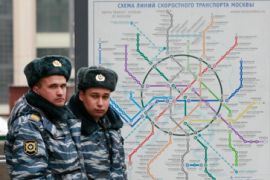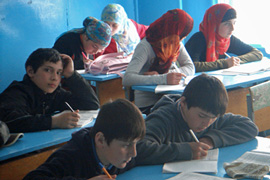From teacher to ‘Moscow bomber’
Parents of Dagestani woman baffled by claims that their daughter was a “black widow”.

 |
| Sharipova grew up in the mountainous village of Balakhani in Dagestan in the North Caucasus |
Four hours’ drive into the arid mountains of Dagestan and there are few reminders that you are still in Russia, save the dusty Cyrillic shop fronts and decaying Soviet-era signposts.
We pass through village after village, the local women wearing noticeably more conservative attire than elsewhere in the republic.
I even see my first full burqa – a rarity even in Russia’s larger cities.
We are en route to the mountain village of Balakhani, the home of Maryam Sharipova, the 28-year-old teacher allegedly turned suicide bomber.
She was one of two women that targeted the Moscow metro on March 28, killing 40 people. The device she was carrying detonated just before 8am local time at the Lubyanka metro station close to the headquarters of the Federal Security Services (FSB).
Dzhannet Abdullaeva, the other bomber, was also from Dagestan and only 17.
She was the widow of Umalat Magomedov, a fighter killed in a Russian special-forces operation. They had met on the internet when she was 16.
Hairpin bends and cliffs
We leave the main road and take a dirt track up a steep pass, negotiating hairpin bends and sheer cliffs.
Patimat Murshidova, Sharipova’s mother, and Rasul Magomedov, the father, still live in Balakhani in the family home where Sharipova grew up.
Her father identified his daughter as one of the killers when a picture of her remains aired on national television.
| IN VIDEO |
 Sharipova’s family in shock |
Magomedov teaches in the village school where Sharipova was deputy principal and an IT specialist.
He is busy giving a Russian lesson to a class of teenagers when we arrive.
While we wait, we talk to Nurmagomed Badruddinov, the school principal.
A faded picture of a young-looking Vladimir Putin, now Russia’s prime minister, hangs sternly on the wall of his office.
“We feel pity and sadness,” he says. “Her death has shocked everyone.”
Multiple diplomas
Sharipova was a straight “A” student throughout school and university. She had diplomas in mathematics and psychology.
Badruddinov describes her as a quiet, withdrawn woman who gave no indication of any fundamentalist links or beliefs.
“The chair you’re sitting in used to be hers,” he said.
The hairs on the back of my neck bristle. I ask if her pupils understand what happened to her.
| in depth | |||||||||||||||||
|
“Of course they do,” he replies. “But only as children can.”
Pictures of their teacher’s dead body circulated quickly via text message.
Sharipova’s parents agree to take us to their home – a tidy, steel-gated house perched on a hillside.
A Slavic-looking man loiters by the main gate. We learn later he is a policeman entrusted with minding the family.
Sharipova’s father last saw his daughter two days before the bombings.
She had taken a taxi with her mother to the regional capital Makhachkala to go shopping.
When they arrived, the two separated, agreeing to meet again later.
The next time Sharipova’s frantic mother would hear of her daughter was in connection with the double suicide bombing thousands of miles away in Moscow.
Both parents deny any knowledge of their daughter’s alleged links to the separatist fighters.
Investigators suspect that Sharipova had carried out the mission to avenge the death of her first husband, a Jordanian national known among fighters as “Doctor Mohammad”, who had come to the North Caucasus in the mid 1990s.
He was killed in 2009 during a special-forces operation. Doctor Mohammed had been friends with Magomedali Vagapov, another wanted fighter who, it is believed, later married Sharipova.
‘Black widow’
Reports in the Russian media suggest that it is “common practice among militants to marry the widows” of their fallen comrades.
Sharipova’s parents deny she had been married at all. Her mother said she had been “greatly distressed” by the attention she received after the accusations of Sharipova’s links to separatists first surfaced.
Her parents also shrugged off suggestions that Sharipova’s brother Anvar, a petrol-station worker living in Moscow, may have co-ordinated the attacks.
 |
| Sharipova was deputy principal at a school in Balakhani |
His parents refused to tell us where he is or when they last spoke.
The family admits to being no stranger to controversy and suspicion.
Ilyas, another brother of Sharipova, was jailed for nine months for possessing a hand grenade.
Even so, Sharipova’s parents are baffled by allegations that their only daughter was a “black widow”.
“I have my own theories about how she ended up in Moscow,” her father told me.
“She could have been kidnapped, it could have been a revenge attack, or it could have been the will of Allah.”
Sharipova’s mother told us: “I want to run away from here, I want to disappear.”
Since news of the bombing reached the village of Balakhani, locals have been living in fear of government reprisals.
This week Dmitry Medvedev, the Russian president, announced the creation of a new anti-terrorism unit to counter armed groups in the Caucasus.
Deadly attacks
There have been four deadly attacks in the North Caucasus region in the last three weeks.
But many in Balakhani and other similar villages fear an increase in special operations targeting entire communities with suspected links and sympathies to the fighters – measures that human-rights groups say have only acted to radicalise the moderate and strengthen the call for jihad against the Russian government.
Most people in Balakhani know that armed fighters live in the surrounding hills and forests.
Some perhaps quietly sympathise with the rebel cause; others could even have direct links.
But the question is whether, for Sharipova, those connections were strong enough to die for or, as her parents believe, she was forced into carrying out a deadly mission against her will.
Few expect to ever have a clear answer.
